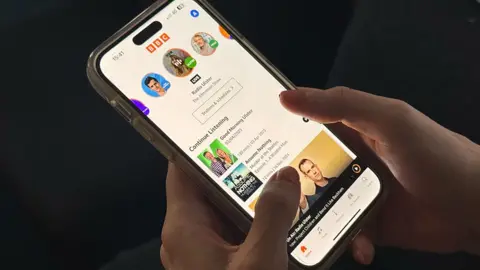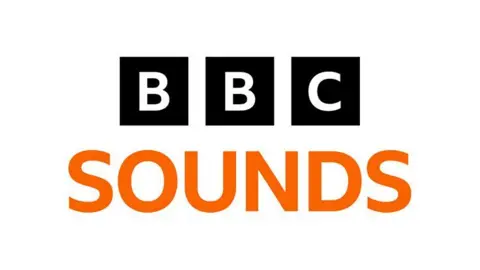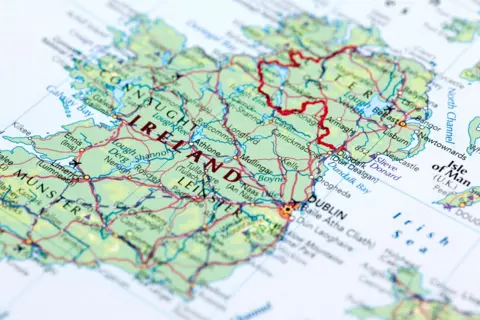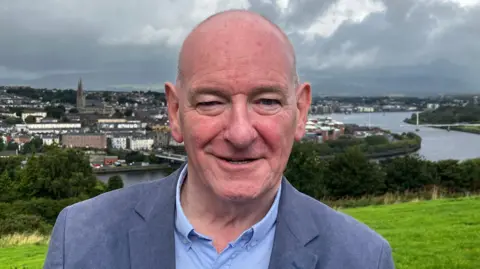Why is BBC Sounds not going to be available in Ireland?
 BBC
BBCBBC Sounds will be blocked for audiences outside the UK later this year.
The decision means listeners in the Republic of Ireland will no longer be able to tune into BBC Radio Ulster or Radio Foyle online.
BBC News NI looks at why this is happening and whether or not it is inconsistent with the Good Friday Agreement, as some people are suggesting.
What is BBC Sounds and what is changing?

BBC Sounds is the online home of BBC radio.
People can listen to live radio streams, on demand programmes, podcasts, audiobooks and music mixes.
It can be accessed via the Sounds website or its dedicated app. People can also listen on many smart speakers and internet radio devices.
The changes will not affect audiences in the UK, but it will affect international listeners and they have already seen a change to their audio offerings.
There is a new Audio section for them on BBC.com - the international website which carries adverts - and their BBC app.
They have access to the BBC's portfolio of current and archived podcasts but just two radio stations, World Service and Radio 4.
A date for geo-blocking the BBC Sounds service has not been confirmed but the BBC said it would be in 2025.
Geo-blocking restricts access to services and content online based on the physical location of the user.
The BBC said UK users who go on holiday outside the UK for a short time will still be able to use the BBC Sounds app.
What does geo-blocking mean for RoI listeners?
Listeners in the Republic of Ireland will not be able to listen to all BBC Radio stations.
However, these changes only impact BBC platforms, as BBC content will remain available on third-party platforms outside the UK, such as Spotify or Apple.
The BBC said the planned changes to BBC Sounds will mirror BBC iPlayer.
Listeners outside of Northern Ireland will still be able to listen to Radio Ulster and Radio Foyle on analogue and DAB overspill.
Why is the BBC geo-blocking its content?
The BBC said the change was made so that BBC Sounds is "exclusively to UK audiences" and will offer better value for UK listeners.
For international users, some BBC content cannot be made available due to "rights limitations", the BBC added.
The change is similar to BBC iPlayer.
Another reason for the change could be money.
The public service broadcaster is primarily funded by the licence fee, paid by UK households, supplemented by income from its commercial subsidiaries.
The BBC Sounds change allows BBC Studios, which distributes BBC content to audiences outside the UK and operates the BBC's international platforms, to generate commercial revenue.
That revenue then goes back to the BBC, delivering, as the BBC says, "better value" for the licence fee payer.
Speaking to BBC Radio Ulster's Talkback programme, the Guardian's former media editor, Jim Waterson, said the BBC's licence fee income was falling and it needed to make more money through its commercial arms.
"If you said to most people (in the UK): 'Is it fair enough to charge people who are listening in the south of France to BBC Sounds?', you'd probably get quite a good response - contribute for the stuff you've previously been getting for free.
"The problem is a lot of people in London forget about the small matter of the border on the island of Ireland."
It is not clear if the BBC will charge international users for content.
At the moment, it is based on BBC Studios carrying advertising which would generate revenue.
Can geo-blocking be country based?
 Getty Images
Getty ImagesKevin Curran, professor of cyber security at Ulster University, said the BBC has options when it comes to geo-blocking.
"You can restrict access to the internet by country...they (the BBC) could open it to any country," he said.
Prof Curran said if the BBC wanted to include Ireland in access to BBC Sounds, "it can be done quite easily - it could probably be done in a morning."
Virtual Private Networks (VPN) are a way some people get around geo-blocking.
This is something that is legal but can breach terms and services depending on what you are looking to access.
Prof Curran said the BBC are "very serious" about VPN users.
"VPN works for a lot of things, like Netflix, but it is hard to work on BBC, like BBC iPlayer. The BBC take that seriously," he added.
Are there political implications?

Questions are being asked about what the change means in relation to the Good Friday Agreement, the 1998 peace deal which brought an end to 30 years of conflict in Northern Ireland, known as the Troubles.
One of the strands in the wide-reaching accord was the relationship between Great Britain and Ireland.
Former SDLP leader Mark Durkan said "the question of people being able to access RTÉ in the north and Irish language broadcasting" formed part of the negotiations.
But negotiations took place before the current digital age.
"We didn't all understand or know what that whole new landscape was going to entail or offer," he said.
Former BBC News NI reporter Shane Harrison told the BBC's right to reply programme Feedback that it could be argued that the BBC Sounds decision broke the spirit of the accord.
He points to a memorandum of understanding (MoU) signed between the the UK and Irish governments in February 2010.
"The two governments acknowledged the role paid by public service broadcasting throughout the island of Ireland - and I am quoting directly now - 'in promoting cultural diversity, in providing educational programming, in objectively informing public opinion, in guaranteeing pluralism, in supplying quality entertainment'," he said.
"The memorandum dates from the time of the digital switchover but both governments committed to exploring options for the reciprocal sharing of public service broadcasting digital radio service."
He added that there were comparisons to Brexit, albeit on a much smaller scale, "where attention is not being paid in England to the practical problems of a small island with two jurisdictions and a legacy of division".
What have the UK and Irish governments said?
The UK Department for Culture, Media and Sport said the BBC was "operationally and editorially independent of the government, and decisions on how it discharges its obligations, such as its changes to its BBC Sounds service, are a matter for the BBC".
Ireland's Department of Tourism, Culture, Arts, Gaeltacht, Sport and Media said the decision to make this change is "entirely a matter for the BBC".
"On this basis, there was no, nor would there have been an expectation of, discussions with this department on the matter," it added.
On the MoU, the spokesperson said it relates to the digital switchover of digital terrestrial television (DTT) and "the BBC Sounds app is a non-linear service which is outside the scope of DTT services".
